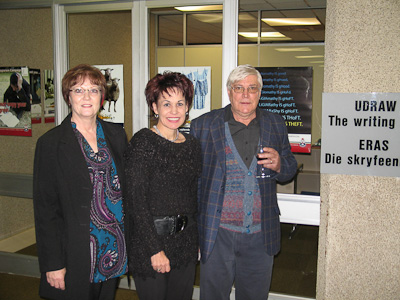Latest News Archive
Please select Category, Year, and then Month to display items
12 January 2024
|
Story Nonsindiswe Qwabe
|
Photo Sonia Small
 Since joining the UFS in 2008, Dr Grey Magaiza has worked extensively on approaches that can foster the socio-economic transformation of societies.
Since joining the UFS in 2008, Dr Grey Magaiza has worked extensively on approaches that can foster the socio-economic transformation of societies.
“The future should be one where communities can decide on their development agenda and futures. That’s the most important for me.” Dr Grey Magaiza, Deputy Director of the Centre for Gender and Africa Studies (CGAS) and Head of the Community Development programme on the Qwaqwa Campus, is passionate about capacitating communities to be agents of change and advancement. His vision for the future emphasises the empowerment of communities to take charge of their development by actively participating in decision making and the implementation of development projects that can improve their lives.
Since joining the UFS in 2008, Dr Magaiza has worked extensively on approaches that can foster the socio-economic transformation of societies. Over the years, he has crafted his research speciality into one that he is most proud of – being an interdisciplinary scientist immersed in the development of communities.
“I’m in a fortunate position of researching what I like. I say ‘fortunate’, because I’ve taken the time to understand what I’m passionate about, which is the overall field of rural livelihoods and livelihood futures – in short, community development. My research starts from an engaged university, understanding the elements that a university must use to enhance transformation and relevance to its immediate community in terms of development.”
One of the ways he has done this is by looking at social entrepreneurship as a development approach for young people in a rural setting. Through workshops with non-profit and civic organisations in Qwaqwa, Dr Magaiza has been helping these organisations to map out their needs and actively meet them through the involvement and support of external role players.
“We understand that communities are part of the national development agenda, but even that national agenda respects community knowledge and intentions and allows communities to shape their identity. A critical enabler of this is community organising. You bring back the capacity in communities to have dialogues on issues affecting them as spaces for engagement, knowledge exchange, and for people to just talk about their way forward.”
By enabling communities to define their development agenda, they can address their specific needs, challenges, and aspirations, he said. “When I look at livelihood futures, it’s quite an exciting aspect of my work – it’s like looking into a fortune tellers’ globe, because you’re not deciding for communities what they should do, but the communities themselves take those decisions.”
UFS opens new Research and UDRAW writing unit
2010-08-27
 |
Ms Huibré Lombard, Prof. Driekie Hay and Prof. Louis Venter in front of the newly opened UDRAW facility in the UFS Sasol Library.
Photo: Christiaan van der Merwe |
The Library and Information Services Division at the University of the Free State (UFS) recently opened two brand-new facilities in the UFS Sasol Library, which includes a new research unit for postgraduate students as well as a new UDRAW Unit (Unit for the Development of Rhetorical and Academic Writing).
The opening of both units is the culmination of planning that originally started with Ms Huibré Lombard, Acting Director of the division Library and Information Services at the UFS, and Prof. Louis Venter, Head of UDRAW, back in 2005. The facilities were officially opened by the Vice-Rector: Teaching and Learning, Prof. Driekie Hay.
The research centre caters for postgraduate students, specifically for those studying towards a Masters or Doctoral degree at the UFS. The centre will help students by supplying advanced research information and specialised staff to cater for their needs. It will also serve as a quiet environment where students can come and work. The UDRAW facility will help shape the writing of postgraduate students as well as supervisors and also provide classes and consultations to further develop the research language of the students. An added benefit for students is that both services are provided free of charge to registered senior postgraduate students at our university.